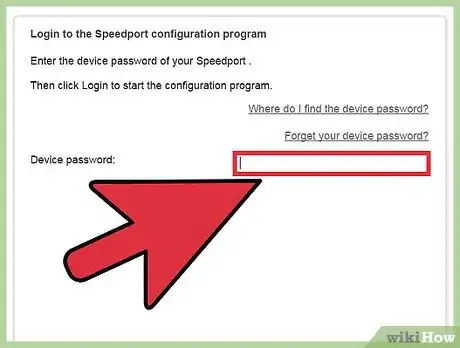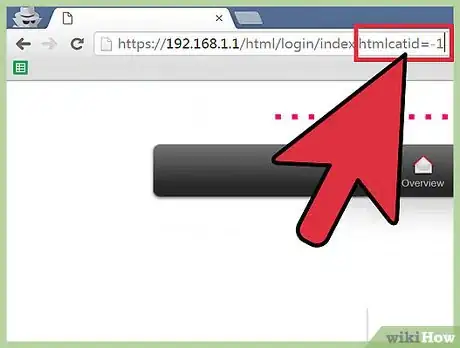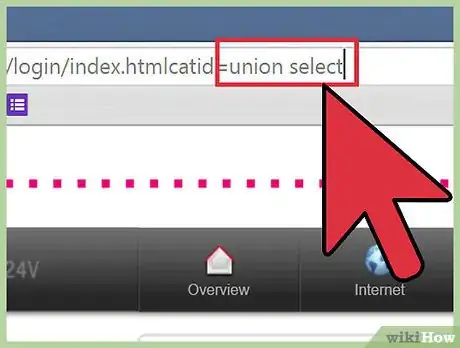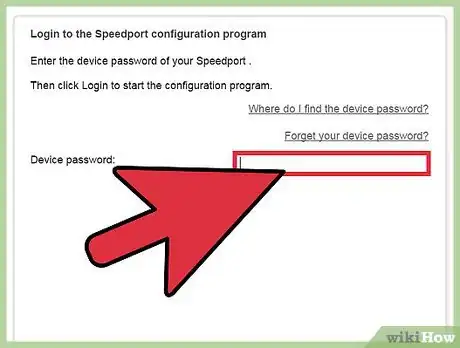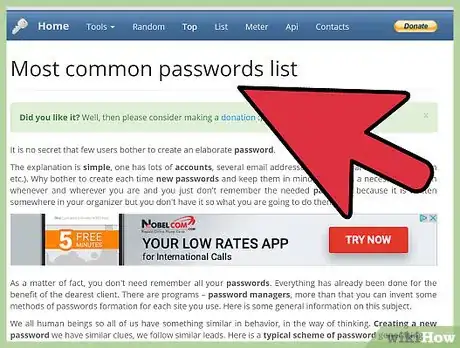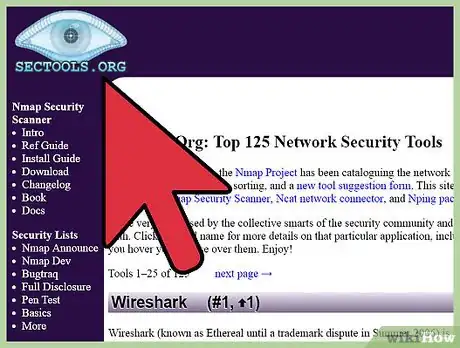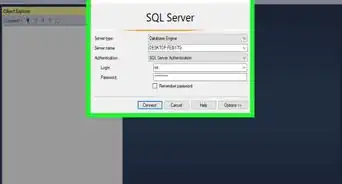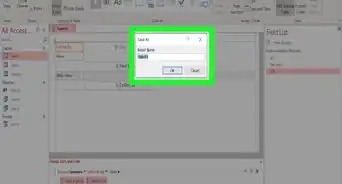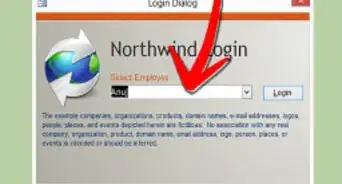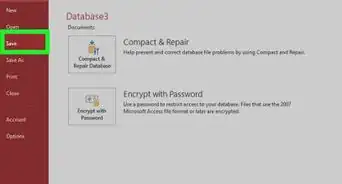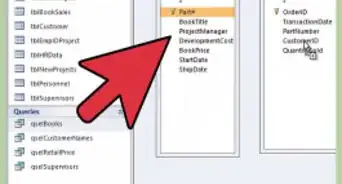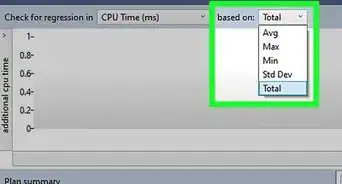wikiHow is a “wiki,” similar to Wikipedia, which means that many of our articles are co-written by multiple authors. To create this article, 47 people, some anonymous, worked to edit and improve it over time.
This article has been viewed 449,490 times.
Learn more...
The best way to make sure your database is secure from hackers is to think like a hacker. If you were a hacker, what sort of information would you be looking for? How would you try to get it? There are numerous types of databases and many different ways to hack them, but most hackers will either try to crack the database root password or run a known database exploit. If you’re comfortable with SQL statements and understand database basics, you can hack a database.
Steps
Using a SQL Injection
-
1Find out if the database is vulnerable.[1] You’ll need to be handy with database statements to use this method. Open the database web interface login screen in your web browser and type a ’ (single quote) into the username field. Click “Login.” If you see an error that says something like “SQL Exception: quoted string not properly terminated” or “invalid character,” the database is vulnerable to SQL injections.
-
2Find the amount of columns.[2] Return to the login page for the database (or any other URL that ends in “id=” or “catid=”) and click into the browser address box. After the URL, hit the space bar and type
order by 1, then hit ↵ Enter. Increase the number to 2 and press ↵ Enter. Keep increasing until you get an error. The actual number of columns is the number you entered before the number that gave you the error.Advertisement -
3Find which columns accept queries. At the end of the URL in the address bar, change the
catid=1orid=1tocatid=-1orid=-1. Hit the space bar and typeunion select 1,2,3,4,5,6(if there are 6 columns). The numbers should count all the way up to the total amount of columns, and each should be separated by a comma. Press ↵ Enter and you’ll see the numbers of each column that will accept a query. -
4Inject SQL statements into the column. For example, if you want to know the current user and want to put the injection in column 2, erase everything after the id=1 in the URL and hit the space bar. Then, type
union select 1,concat(user()),3,4,5,6--. Hit ↵ Enter and you will see the name of the current database user on the screen. Use any SQL statements you’d like to return information, such as lists of usernames and passwords to crack.
Cracking the Database Root Password
-
1Try logging in as root with the default password. Some databases don’t have a root (admin) password by default, so you may be able to get in leaving the password field empty. Some others have default passwords that can be found easily by searching database tech support forums.
-
2Try common passwords. If the admin secured the account with a password (a likely situation), try common username/password combinations. Some hackers publicly post lists of passwords they’ve cracked while using auditing tools. Try some different username and password combinations.
- A reputable site with collected password lists is https://github.com/danielmiessler/SecLists/tree/master/Passwords.
- Trying passwords by hand can be time-consuming, but there’s no harm in giving it a shot before breaking out the big guns.
-
3Use a password auditing tool. You can use a variety of tools to try thousands of dictionary words and letter/number/symbol combinations by brute force until the password is cracked.
- Tools like DBPwAudit (for Oracle, MySQL, MS-SQL and DB2) and Access Passview (for MS Access) are popular password auditing tools that can be run against most databases.[3]
You can also search Google for newer password auditing tools specifically for your database. For instance, a search for
password audit tool oracle dbif you’re hacking an Oracle database. - If you have an account on the server that hosts the database, you can run a hash cracker like John the Ripper against the database’s password file. The location of the hash file is different depending on the database.[4]
- Only download from sites that you can trust. Research tools extensively before using them.
- Tools like DBPwAudit (for Oracle, MySQL, MS-SQL and DB2) and Access Passview (for MS Access) are popular password auditing tools that can be run against most databases.[3]
You can also search Google for newer password auditing tools specifically for your database. For instance, a search for
Running Database Exploits
-
1Find an exploit to run.[5] Sectools.org has been cataloging security tools (including exploits) for over ten years. Their tools are reputable and used by system administrators all over the world for security testing. Browse their “Exploitation” database (or find another trustworthy site) to find tools or text files that help you exploit security holes in databases.
- Another site with exploits is www.exploit-db.com. Go to their website and click the Search link, then search for the type of database you want to hack (for example, “oracle”). Type the Captcha code in the provided square and search.
- Be sure you research all exploits you plan to try so you know what to do in case of potential issues.
-
2Find a vulnerable network by wardriving.[6] Wardriving is driving (or biking, or walking) around an area while running a network scanning tool (like NetStumbler or Kismet) in pursuit of an unsecured network. Wardriving is technically legal. Doing something illegal from a network you find while wardriving is not.
-
3Use the database exploit from the vulnerable network. If you’re doing something you’re not supposed to be doing, it’s probably not a good idea to do it from your own network. Connect wirelessly to one of the open networks you found while wardriving and run the exploit you’ve researched and chosen.
Community Q&A
-
QuestionHow would I hack a school exam council?
 Community AnswerYou have to figure out the parameters of the school exam council. What do you want to hack? Is wifi available? Do they have (connected) cameras in the room? A big part of being a hacker is finding an entry point. So, make sure you study the situation before doing anything big.
Community AnswerYou have to figure out the parameters of the school exam council. What do you want to hack? Is wifi available? Do they have (connected) cameras in the room? A big part of being a hacker is finding an entry point. So, make sure you study the situation before doing anything big. -
QuestionHow do I hack a government database?
 Community AnswerWith difficulty. Governments across the world build in to their risk assessments the possibility of users with malicious intent and overseas government agencies and build in safeguards against these. Unless you are an experienced hacker, you will stand little to no chance of getting in. You're better off searching for tutorials and general advice on hacking data centers rather than specifically asking about government ones. I am a business analyst for a government organization currently working on data center replication.
Community AnswerWith difficulty. Governments across the world build in to their risk assessments the possibility of users with malicious intent and overseas government agencies and build in safeguards against these. Unless you are an experienced hacker, you will stand little to no chance of getting in. You're better off searching for tutorials and general advice on hacking data centers rather than specifically asking about government ones. I am a business analyst for a government organization currently working on data center replication. -
QuestionHow do I hack any WiFi password?
 Community AnswerOften most people will use simple exploits. OSes Such as Kali Linux have a huge variety of tools.
Community AnswerOften most people will use simple exploits. OSes Such as Kali Linux have a huge variety of tools.
Warnings
- Gaining access to a database that isn’t yours is illegal.⧼thumbs_response⧽
- Never try to gain illegal access to a machine from your own network.⧼thumbs_response⧽
- Understand the laws and repercussions of hacking in your country.⧼thumbs_response⧽
References
- ↑ http://blog.red-database-security.com/2009/01/17/tutorial-oracle-sql-injection-in-webapps-part-i/
- ↑ https://blog.udemy.com/sql-injection-tutorial/
- ↑ http://opensourceeducation.net/database-auditing-with-open-source-tool/
- ↑ http://www.openwall.com/john/doc
- ↑ http://sectools.org
- ↑ http://www.seattletimes.com/business/seattles-packed-with-wi-fi-spots/

